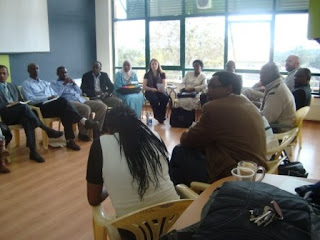 Members in a meeting to agree on the MOU
Members in a meeting to agree on the MOUThe members of the civil society under the umbrella of Rwenzori Consortium for Civic Competence – RWECO for short working on issues of election monitoring in the Rwenzori region in partnership with HIVOS; CEFORD and ACORD – working on issues of promoting good governance in West Nile and Acholi regions respectively in partnership with Oxfam Novib; and Public Affairs Centre working on civic empowerment in Teso region in collaboration with Oxfam GB; Have formed a consortium called Citizens Election Watch-IT or CEW- IT in short. This is based on the desire to contribute to building the competence of the grassroots in civic matters and working together so as to strengthen civic participation in the promotion of fairness and transparency in the electoral process in Uganda. CEW-IT Specific Objectives are:
To develop a harmonized approach to enhancing civic participation in the electoral process, decision making, monitoring and information sharing using modern ICT and other pragmatic approaches.

To strengthen advocacy on policy issues in regard to the electoral process in Uganda.
To share resident capacities among the CEW- IT members and sister organizations that do similar work.
To strengthen the citizens’ voice and influence through improved dialogue and engagement between the leaders and their constituencies.
To jointly mobilize and manage resources for the consortium.
To network with other agencies at the regional, national and international level that have similar objectives.
Ultimately, CEW-IT brings on board resources and personnel skills RWECO members such as:Integrated Women Development Programme (IWDP), Good Hope Foundation For Rural Development (GHFRD), Karambi Action for Life Improvement (KALI), Rwenzori Information Centers Network (RICNET), Rwenzori Anticorruption Coalition (RAC) and Kabarole Research and Resource Centre (KRC) ; working in western Uganda. CEFORD, ACORD and PAC working in the Eastern (Teso Karamoja regions ),west Nile region and Northern region.
The above organization have signed an MOU that governs their operation and will deploy over 6000 monitors assistance with 150 IT personnel to ensure that the information the monitors collect is put on web based platforms similar to www.uchaguzi.co.ke or www.rwenzoripeoplesvoice.org










